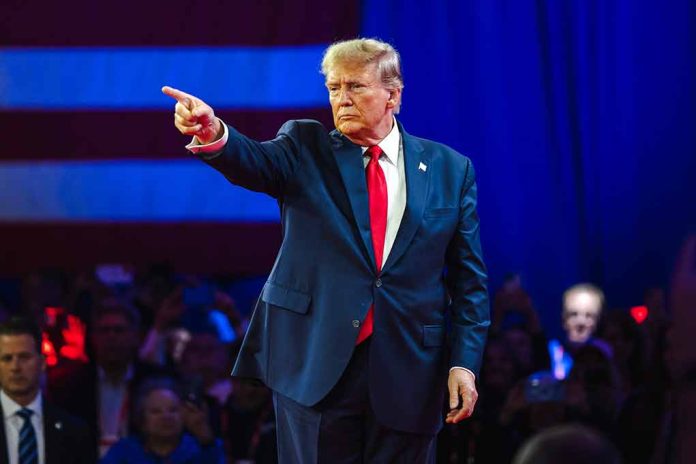
Trump’s bombshell revelation: U.S. national debt may be lower than reported due to potential fraud in Treasury payments.
At a Glance
- Trump suggests U.S. debt might be lower than the reported $36 trillion due to potential fraud
- Administration officials reviewing payment records for wasteful spending and fraud
- Elon Musk tasked with overhauling federal government efficiency
- Federal judge temporarily blocks Musk’s team from accessing sensitive financial systems
- Trump’s domestic aid freeze legally challenged, affecting various federal projects
Trump Raises Alarm on National Debt Discrepancies
In a startling revelation aboard Air Force One, President Donald Trump has suggested that the United States’ national debt might be significantly lower than the widely reported $36 trillion figure. This assertion comes amidst growing concerns over potential fraudulent activities within U.S. Treasury operations, hinting at a possible misrepresentation of the country’s actual debt situation.
Donald Trump said his administration was examining US Treasury debt payments for possible fraud and suggested that the country's $36 trillion debt load might not be that high https://t.co/kIKgjdNCy0
— Reuters (@Reuters) February 10, 2025
Trump’s administration has initiated a thorough review of payment records, aiming to identify wasteful spending and possible fraud in debt payments. This move comes at a critical time when the U.S. public debt stands at a staggering $36.2 trillion, exceeding 120% of the country’s GDP and necessitating increased borrowing to avoid default.
Presidential Concerns Over Treasury Operations
The President’s comments have sent shockwaves through financial circles, raising questions about the accuracy of national debt reporting. Trump’s focus on potential irregularities in Treasury operations suggests a deeper issue that could have far-reaching implications for the country’s economic outlook.
These remarks underscore the administration’s commitment to uncovering potential discrepancies in the national debt figures. However, it’s worth noting that Trump’s proposed tax cuts could potentially increase the national debt, creating a complex financial landscape for policymakers to navigate.
Musk’s Role in Government Efficiency Overhaul
In a bold move to address government inefficiencies, President Trump has enlisted tech mogul Elon Musk to spearhead a comprehensive overhaul of federal operations. Musk’s appointment to lead the newly formed “Department of Government Efficiency” has sparked both excitement and controversy, with supporters hailing it as a necessary step towards streamlining bureaucracy and critics raising concerns about privacy and security.
The initiative has faced legal hurdles, with a federal judge temporarily blocking Musk’s team from accessing government payment systems due to privacy risks. Treasury Secretary Scott Bessent attempted to allay fears by stating that Musk’s team only had “read-only” access to the payment system, but concerns persist about the security of sensitive financial information.
Impact on Federal Programs and Funding
As the administration grapples with these financial investigations and efficiency measures, Trump’s efforts to freeze domestic aid have been met with legal challenges. This has affected funding for various projects, including clean energy initiatives and transportation improvements. The repercussions of these funding delays are already being felt across the country, with some health clinics forced to lay off staff and close facilities due to withheld federal funding.
The ongoing situation highlights the delicate balance between pursuing governmental efficiency and safeguarding the integrity of financial systems. As the administration continues its efforts to uncover potential fraud and streamline operations, the impact on federal programs and the national debt remains a topic of intense scrutiny and debate.






















